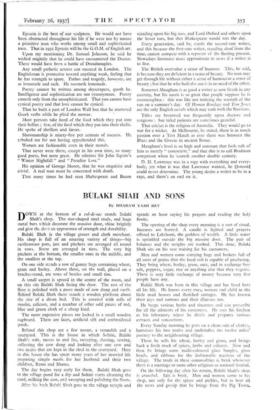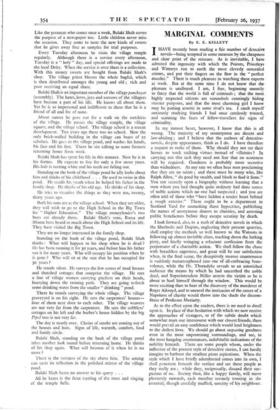JAMMU SHAH AND SONS
By DHARAM YASH DEV
DOWN at the bottom of a cul-de-sac stands Bulaki Shah's shop. The star-shaped steel studs, and huge metal bars v. hich decorate the massive door, shine brightly and give the doer an appearance of strength and durability.
Bulaki Shah is the village grocer and cloth merchant. His shop is full of an amazing variety of things—big earthenware pots, jars and pitchers are arranged all round in rows. Some are arranged in tiers. The very big pitchers at the bottom, the smaller ones in the middle, and the smallest at the top.
On one side stands a row of gunny bags containing wheat, gram and barley. Above these, on the wall, placed on a bracket-stand, are rows of bottles and small tins.
A small carpet is spread in the centre of the room, and on this sits Bulaki Shah facing the door. The rest of the floor is polished with a paste, made of cow dung and earth. Behind Bulaki Shah there stands a wooden platform about the size of a divan bed. This is covered with rolls of muslin, calicoes, and a number of other odd pieces of red, Mite and green cloth of a cheap kind.
The more expensive pieces are locked in a small wooden cupboard. There are laces, artificial silk and embroidered goods.
Behind this shop are a few rooms, a verandah and a courtyard. This is the house in . which Sohini, Bulaki Shah's wife, moves to and fro, sweeping, .dusting, sewing, collecting the cow dung and looking after one cow and two mules that are kept in the shed in the courtyard. Here in this house she has spent many years of her married life preparing simple meals_ for her husband and their two children, Rama and Shama.
The day begins very early for them. Bulaki Shah goes to the village pond for a dip and Sohini starts churning the curd, milking the cow, and sweeping and polishing the floors.
After his bath Bulaki Shah goes to the village temple and spends an hour saying his prayers and reading the holy books.
The opening of the shop every morning is a sort of ritual. Incenses are burned. A candle is lighted and prayers offered to Lakshami, the goddess of wealth. A little water is sprinkled outside the big massive door. The pair of balances and the weights are washed. This done, Bulaki Shah sits on his seat waiting for his customers.
Men and women come carrying bags and baskets full of all sorts of grains that the local soil is capable of producing. They bring wheat, barley, gram, oats, and in exchange buy salt, peppers, sugar, rice or anything else that they require. There is very little exchange of money because very few people have any.
Bulaki Shah was born in this village and has lived here all his life. He knows every man, woman and child in the little mud houses and thatched cottages. He has known their joys and sorrows and their illnesses too.
He keeps various herbs and tinctures and can prescribe for all the ailments of his customers. He uses his kitchen as his laboratory where he distils and prepares various extracts and concoctions.
Every Sunday morning he puts on a clean suit of clothes, harnesses his two mules and undertakes the twelve miles' journey to the neighbouring village.
There he sells his wheat, barley and gram, and brings back a fresh stock of spices, herbs and calicoes. Now and then he brings some multi-coloured glass bangles, glass beads, and ribbons for the fashionable maidens of the village. The trade in these commodities is brisk whenever there is a marriage or some other religious or national festival.
On the following day after his return, Bulaki Shah's shop is crowded. Sale is brisk. Men and women come to his shop, not only for the spices and pickles, but to hear all the news and gossip that he brings from the Big Town. Like the postman who comes once a week, Bulaki Shah serves the purpose of a newspaper too. Little children never miss the occasion. They come to taste the new kinds of sweets that he gives away free as samples for trial purposes.
Every Tuesday afternoon he visits the village temple regularly. Although there is a service every afternoon, Tuesday is a " holy " day, and special offerings are made to the local Deity. When the service is over there is a collection. With this money sweets are bought from Bulaki Shah's shop. The village priest blesses the whole bagful, which is then distributed amongst the young and old ; rich and poor receiving an equal share.
Bulaki Shah is an important member of the village panchayat (assembly). The hates, loves, joys and sorrows of the villagers have become a part of his life. He knows all about them. Yet he is so impersonal and indifferent to these that he is a friend of all and foe of none.
About sunset he goes out for a walk on the outskirts of the village. He passes the village temple, the village square, and the village school. The village school is a recent development. Ten years ago there was no school. Now the only brick-walled building in the village can boast of 22 scholars. He goes to the village pond, and washes his hands, his face and his feet. There he sits talking to some farmers returning home from work.
Bulaki Shah has spent his life in this manner. Now he is in his forties. He expects to live for only a few more years. His hair is turning white and his teeth are falling out.
Standing on the bank of the village pond he idly looks about him and thinks of his childhood . . . He used to swim in this pond. He recalls his youth when he helped his father in the family shop. He thinks of his old age. He thinks of his shop.
He tries to visualise the things as they were ten, twenty, thirty years ago.
Both his sons are at the village school. When they are older, they will wish to go to the High School in the Big Town for " Higher Education." The village moneylender's two boys are already there. Bulaki Shah's sons, Rama and Shama have heard so much about the High School and its life. They have visited the Big Town.
They are no longer interested in the family shop.
Standing on the bank of the village pond, Bulaki Shah thinks : What will happen to his shop when he is dead ? He has been running it for 3o years, and before him his father ran it for many years. Who will occupy his position when he is gone ? Who will sit at the seat that he has occupied for 3o years ?
He stands silent. He surveys the few scores of mud houses and thatched cottages that comprise the village. He sees a line of village women carrying pitchers on their heads, hurrying down the twining path. They are going to fetch some drinking water from the smaller " drinking " pond. There he stands surveying the whole village. The village graveyard is on his right. He sees the carpenters' houses— four of them next door to each other. The village weavers are not very far from the carpenters. He sees the cobblers' cottages on his left and the barber's house hidden by the big Pipal tree is not very far.
The day is nearly over. Chains of smoke are coming out of the houses and huts. Signs of life, warmth, comfort, food and family circle.
Bulaki Shah, standing on the bank of the village pond takes another look round before returning home.' He thinks of his shop again. What will become of it when he is no more ?
There is the vastness of the sky above him. The setting sun casts its reflection in the polished mirror of the village pond.
Bulaki Shah hears no answer to his query . . .
All he hears is the faint rustling of the trees and ringing of the temple bells.



















































 Previous page
Previous page